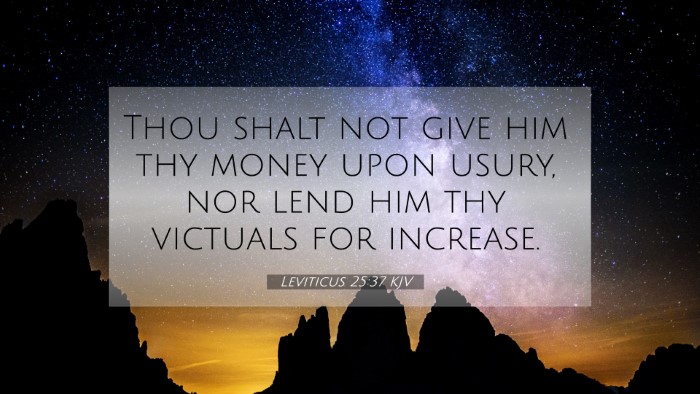Understanding Leviticus 25:37
Leviticus 25:37 states: "Thou shalt not give him thy money upon usury, nor lend him thy victuals for increase." This verse serves as a key instruction concerning the ethical treatment of fellow Israelites regarding lending practices.
Meaning and Context
The overarching theme of Leviticus is to provide guidelines for holiness within the community of Israel. In Leviticus 25, God establishes principles for the Year of Jubilee and the laws concerning the poor and the needy.
Matthew Henry highlights the moral implications of this verse, noting that it emphasizes the importance of compassion and fairness in financial dealings. The prohibition of usury indicates that the Israelites were expected to support one another without taking advantage of their neighbors' misfortunes.
Albert Barnes adds that usury, or interest on loans, was not permitted among the Israelites, differentiating their practices from those of surrounding nations. This principle serves to promote social justice and to strengthen community ties.
Adam Clarke elaborates on the potential societal impacts of usury, noting that it could lead to the exploitation of the poor and the alienation of community members. Thus, the commandment to refrain from usury is rooted in a broader ethical framework that values community solidarity.
Interpreting Leviticus 25:37
At its core, Leviticus 25:37 calls for fairness and equity in financial transactions. It encourages individuals to act with love and kindness rather than seeking personal gain at the expense of others.
This principle resonates with many other biblical texts that stress the importance of helping those in need. Below are some relevant cross-references that provide deeper insights into the themes of generosity and ethical lending:
Cross-References
- Exodus 22:25 - "If thou lend money to any of my people that is poor by thee, thou shalt not be to him as a usurer, neither shalt thou lay upon him usury."
- Deuteronomy 23:19 - "Thou shalt not lend upon usury to thy brother; usury of money, usury of victuals, usury of anything that is lent upon usury."
- Psalms 15:5 - "He that putteth not out his money to usury, nor taketh reward against the innocent. He that doeth these things shall never be moved."
- Proverbs 28:8 - "He that by usury and unjust gain increaseth his substance, he shall gather it for him that will pity the poor."
- Ezekiel 18:8 - "He that hath not given forth upon usury, neither hath taken any increase, that hath withdrawn his hand from iniquity, hath executed true judgment between man and man."
- Luke 6:34-35 - "And if ye lend to them of whom ye hope to receive, what thank have ye? for sinners also lend to sinners, to receive as much again. But love ye your enemies, and do good, and lend, hoping for nothing again; and your reward shall be great."
- Romans 13:8 - "Owe no man any thing, but to love one another: for he that loveth another hath fulfilled the law."
- Hebrews 13:5 - "Let your conversation be without covetousness; and be content with such things as ye have: for he hath said, I will never leave thee, nor forsake thee."
- James 5:1-4 - "Go to now, ye rich men, weep and howl for your miseries that shall come upon you. Your riches are corrupted, and your garments are moth-eaten... Behold, the hire of the laborers who have reaped down your fields, which is of you kept back by fraud, crieth: and the cries of them which have reaped are entered into the ears of the Lord of sabaoth."
Thematic Connections
Leviticus 25:37 is intricately connected to the themes of social equity and community support throughout Scripture. The call to lend without interest not only reflects an economic principle but also embodies a theological stance on the interconnectedness of God's people.
As highlighted in Matthew Henry's commentary, the guidance extends beyond financial transactions to encompass a lifestyle of generosity and service. Albert Barnes points out that true adherence to this command demands a heart aligned with the divine will for justice and compassion.
In this light, the verse relates to a broader framework within the Bible that advocates for the poor and marginalized, urging believers to actively contribute towards uplifting them rather than exploiting their conditions.
Practical Application
For contemporary readers, Leviticus 25:37 challenges us to reflect on our own attitudes towards money and lending. It invites a re-examination of our practices to ensure they align with biblical ethical standards. Here are some points to consider:
- Support Neighbors: Look for opportunities to provide assistance without expecting anything in return, especially to those in financial need.
- Fair Practices: Ensure that your financial dealings with others are transparent and just, avoiding exploitative practices.
- Advocate for Justice: Be an advocate for social equity in your community, challenging systems that perpetuate poverty and exploitation.
- Teach Generosity: Encourage others to adopt a similar approach of kindness and generosity, emphasizing the significance of community welfare over personal gain.
Conclusion
Leviticus 25:37 offers profound insights into the ethical dimensions of lending and community responsibility. Through cross-referencing other biblical texts, we can see how this principle of aiding those in need is a consistent theme throughout the Bible.
By adhering to these teachings, believers can cultivate a community rooted in love, support, and mutual respect, ultimately fulfilling God's command to love our neighbors.


